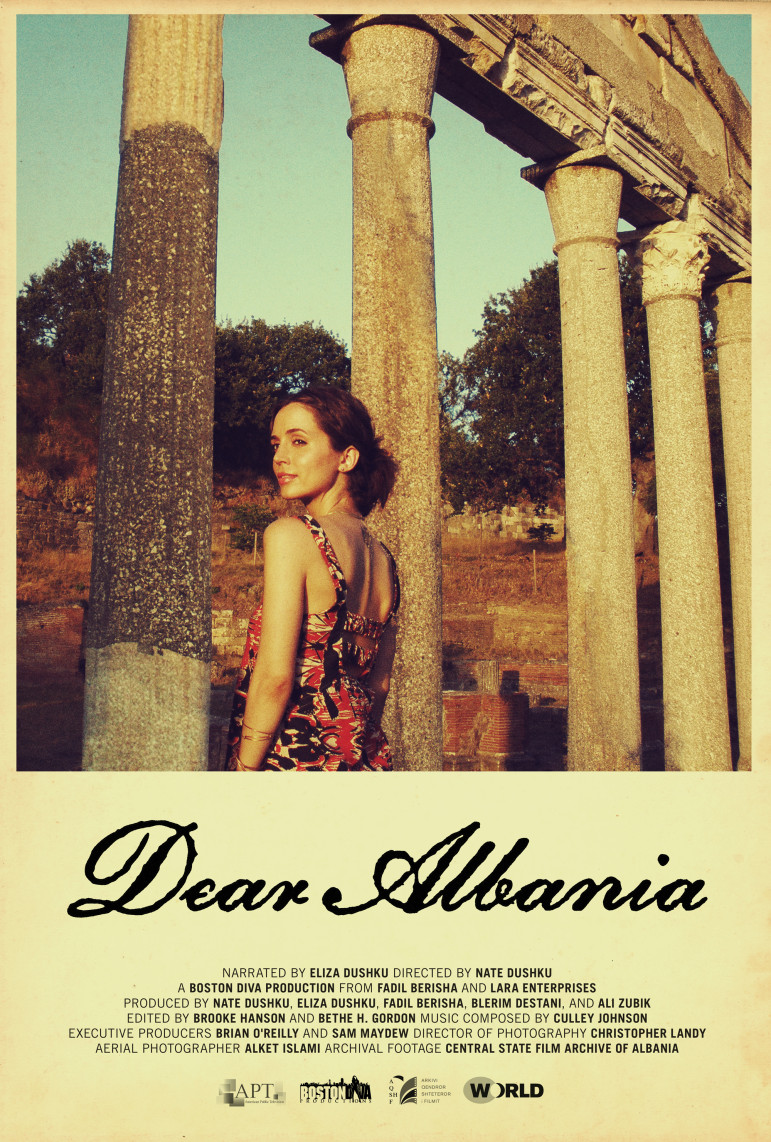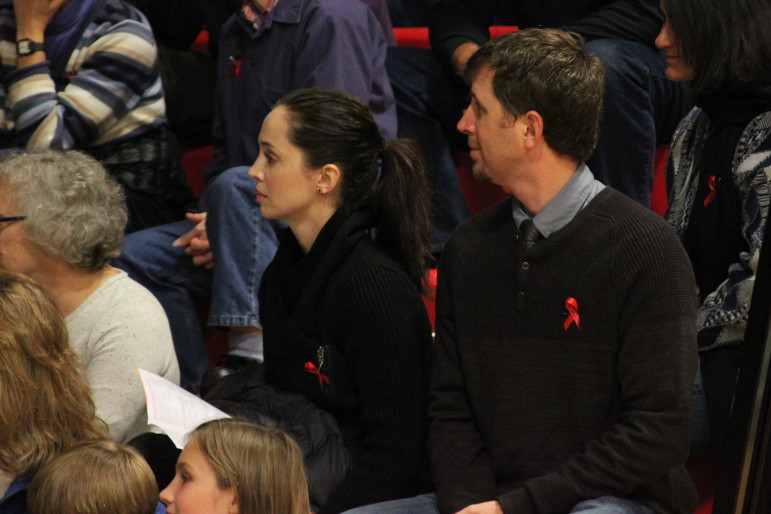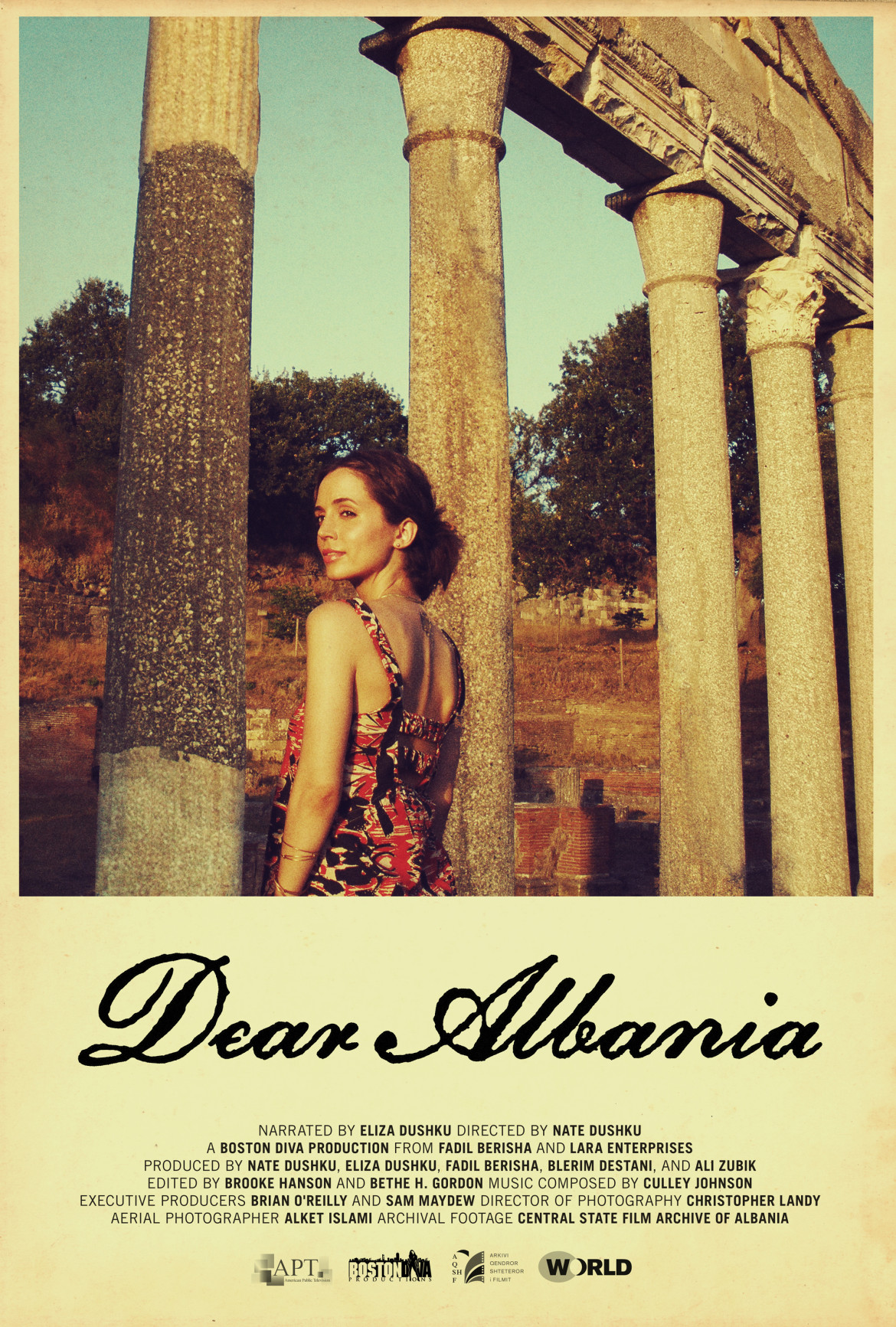
The poster for Eliza and Nate Dushku’s documentary “Dear Albania,” currently showing on PBS.
Eliza Dushku’s latest project is not a Hollywood blockbuster, but a documentary film. During the making of “Dear Albania” she found out more about the land of her ancestors and how it helped explained the passionate and compassionate sides of her personality.
The film is five years in the making and debuted Monday night on WGBH’s World station. On Monday, she was at the Town Diner in Coolidge Square to talk to a few media outlets about her new project.
She knew little about Albania and growing up in Watertown, she was often confused for being from one of the town’s other major immigrant groups.
“In grade school teachers would ask, what’s your background, and we’d say Albanian,” Dushku recalled. “They’d say, you mean Armenian. And we’d say, no, we mean Albanian.”
Dushku is Albanian on her father’s side, but he did not share much of his culture with her or her three brothers Aaron, Nate and Benjamin.
“Our father (Philip) Americanized so deliberately,” Dushku said. “His parents did not speak English, and he struggled as an immigrant growing up in the South End of Boston. He didn’t pass on his traditions, stories and history, so we decided to go after it.”
Dushku first visited Albania when she presented the grand prize in the Eurovision Song Contest.
“I became a national hero overnight,” Dushku said. “And I say that with the greatest sincerity.”
She and two of her brothers went over, and they had an instant, strong connection. All of them got tattoos of the the Albanian double headed eagle.
Dushku and her brother Nate – also an actor – returned five years ago to make a film about a country that few in the United States know, and what little they do know, she believes, is far from the reality.
The Balkan nation was under Communist rule and a dictatorship until 1990. Now many people think of it as home to gangsters, or the kidnappers from the movie “Taken,” she said.
Dushku found Albanians were very welcoming, and she could see where parts of her own personality came from.
“Our ‘Albanian-ness’ is characterized by our loyalty, fiery passion, stubbornness, our will, but also – contrary to what people believe – they are such a welcoming generous people,” Dushku said.
Albanians have a concept of “besa,” which means the take people in their home and promise to protect them.
“They were one of the few countries in World War II which took Jews into their homes,” Dushku said.
“Dear Albania” started without a script, just the two Dushkus hitting the ground running.
“We went to 15 cities in 15 days,” Dushku said.
They met with the prime minister and with the pop star known as the “Albanian Madonna.”
Recently, Dushku returned to Albania to interview the current prime minister, to make sure to cover all the political bases.
Then it was Nate’s job to edit the film.
“We went through every single frame of the hundreds of hours of footage and crammed it into a one hour special,” Dushku said.
The film will be repeated on Saturday morning at 5 a.m. on WGBH World (Comcast Ch. 209, RCN Ch. 94 and Ch. 2.2 over air). Set your recorder!
What’s Next?
Along with the debut of her documentary, Dushku recently wrapped up some other projects. She shot a four episode arc in the Cinemax Series “Banshee,” and a movie she shot two years ago, “Jane Wants a Boyfriend” will hit the theaters later this year.
As far as new projects, she is not sure what the future holds.
“Looking at 2016, for the first time in some time I don’t know what the plan for the year is,” Dushku said.
She said it could just as likely be a comedy as a bloody thriller. Dushku and her brother Nate do plan to start shooting a biopic on the artist Robert Mapplethorpe in New York this spring.
Meanwhile, she has plenty of non-show biz work going on.
She will lead a group to Uganda as part of her work with her mother Judy’s foundation, THRIVE-Gulu, which helps victims of the Ugandan Civil War.
“It is in Northern Uganda, the epicenter where most of the abductions occurred,” Dushku said. “The rebel army began abducting people, turning the girls into sex slaves and the boys into child soldiers.”
Each year, the group goes and helps the staff members in Uganda. Dushku said she hopes to put to use her new training as a yoga teacher, which she got from Core Power Yoga in Newton.
THRIVEGulu raises about $30,000 a year for its programs. Among its supports is Joss Whedon, who created Buffy the Vampire Slayer, Dollhouse and other of Dushku’s works. For more information go to thrivegulu.org

Charlie Breitrose
Eliza Dushku and her brother Aaron, a Town Councilor, attended the Erase the Stigma event which raised awareness of the problem of addiction in Watertown.
Dushku has also been attending Suffolk University to get her bachelor’s degree in sociology. She plans to use her degree to help out in her hometown.
“My ultimate goal with my degree is to work with addiction and recovery,” Dushku said. “We really need to keep healing in the community and help combat the epidemic of addiction and substance abuse.”
Dushku has attended some of the events in Watertown that raised awareness about the problems of opiates and heroin, and remembering those who have been lost. Heroin and opiates claimed the lives of 10 people from Watertown in 2015. She also speaks from a perspective of someone who has battled addiction.
“I got sober eight years ago,” Duskhu said. “I have spent eight years helping others. Help was so freely given to me. It is an extraordinary feeling to help someone get out of that hopeless place.”
She applauded the efforts of groups in Watertown to erase the stigma of addiction. However, it can be a tricky situation because the foundation of many recovery groups is that members remain anonymous.
“It is wrapped in anonymity, but at the same time people are dying,” Dushku said. “If everyone is silent, it still carries the stigma.”
Dushku said she is glad to see the efforts by members of the Watertown Community to take on opiates and addiction and help others find recovery.
“We will see what we can do as a group,” Dushku said. “I am so grateful for the life it has given me back.”

Eliza Dushku is quite a remarkable, talented, beautiful and mutilfaceted young woman. I am in awe of her energy and the scope of the many projects that she is engaged in. Amazing how she stays connected to Watertown and I have gotten a chuckle each time I have seen her on the 71 bus!
71 is the Wateriwn Mt Auburn Street bus to Watertown Square!!!